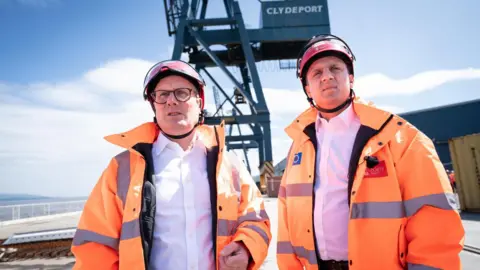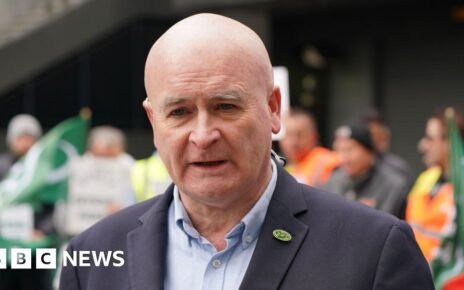[ad_1]
 PA Media
PA MediaChange is afoot for the economy, whatever the result of the general election on 4 July.
While the battle for Westminster votes and seats takes place, the ground is also being prepared for the next Scottish Parliament election in less than two years.
Parties are looking to shift ground – and the key issue is economic growth.
Labour leader Sir Keir Starmer has taken his message about a state-owned energy company to Scotland, where the headquarters would be based. Aberdeen thinks it is the leading candidate to be the location.
There have been SNP plans for an energy supplier before, using the buying power of the state to challenge the dominant private sector providers of gas and power.
The Labour proposals are not going there. They seem to be more upstream, where the power is generated. GB Energy will take stakes in renewable energy projects.
‘Skin in the game’
Anas Sarwar, the Scottish Labour leader, told the Prosper economic forum in Edinburgh on Thursday that the party would provide reassurance to private investors that government can be a reliable partner because “it has skin in the game”.
In recent years, the energy industry has not seen the Tories, Labour or the SNP as reliable partners because of inconsistent approaches to tax for offshore energy, licensing for further drilling or the consents it needs for renewable developments.
Labour is now the main concern for the oil and gas industry. Mr Sarwar sent clear signals at the Prosper event that Labour will “not turn off the taps.”
“Oil and gas will play a role in the energy mix for decades to come,” he said.
However, industry figures in the north east of Scotland are waiting to hear from Sir Keir Starmer and environment spokesman Ed Miliband how the party’s position at Westminster can be squared with that of Anas Sarwar.
Labour strategy at Westminster is to refuse new drilling licences by offshore operators, while recognising those granted up until this election. Conservative ministers have been accelerating that process in recent months.
Labour’s position has met with criticism from the industry and in the north-east of Scotland, which has many jobs dependent on the sector.
But the Westminster leadership has chosen a hard line against further drilling to show its commitment to action on climate change, boost its green credentials against a challenge from Green Party candidates and to emphasise the economic opportunity of renewable power.
Rents and renewables
Mr Sarwar’s speech to the Prosper forum, which consisted of private, public and third sector organisations, also set out some big changes for Labour’s pitch at the Holyrood election in 2026.
These days, profit is good. Labour is “unashamedly pro-growth and pro-business”.
That includes re-thinking plans for rent controls to ensure they do not discourage investment in housing.
Mr Sarwar said increased income tax on higher earners in Scotland put the country “at a competitive disadvantage”.
He backed reform of business rates, which the retail sector in particular has been crying out for.
He also addressed problems with the planning system, which lacks staff to deal with a heavy workload, including the looming cascade of renewable energy applications.
In the forum’s discussion of the huge opportunity from renewable energy, the problems with slow and inconsistent planning kept arising. This was not just for industrial sites but for housing all those people whose new jobs are being promised.
Labour now plans a national organisation to handle planning applications, with centres of excellence on different types of application, drawing together 32 different council offices.
That may look like centralisation, but it sounds like local councillors would still retain the main role in planning decisions, once the officials have done the necessary work.
Incidentally, planners are being less pressured by applications for solar panels on industrial buildings, offices and the roofs of homes. As of last week, the rules have been significantly relaxed in Scotland.
 Prosper
ProsperAlso speaking to the Prosper event was the SNP’s Kate Forbes, three weeks into her job as deputy first minister and economy secretary in the Scottish government.
It was a reminder that governing goes on in devolved administrations, and that the John Swinney/Kate Forbes leadership team has change in mind, even during an election campaign.
Some changes may be included in the election manifesto and other shifts in direction are being postponed until after the Westminster ballot due to civil service rules on campaign impartiality.
Ms Forbes was also keen to highlight her credentials as a friend of business, dropping heavy hints of change in the pipeline for coming weeks.
She is seeking to revise plans for housing regulation, acknowledging the harm done to private sector investment by the current rent control plans.
With income tax diverging from Westminster, the SNP minister said there would be a further statement shortly which was intended to reduce uncertainty about tax rates, while repeating her view that income tax cannot increase continually.
Licensed to drill
The Highland MSP also said ministers had been “too glib” about what they call “just transition” from oil and gas to renewable energy, when there is a risk that running down fossil fuels too fast would “cut [the industry] off at its knees”.
The Scottish government’s draft energy plan, under previous SNP leadership, said there should be a presumption against further drilling licences, but there is pressure within the SNP to change that and to be more supportive of the sector.
The power to issue licences, however, lies with the Westminster government. The SNP position is not decisive, but the signal matters politically.
This raft of measures not only seeks to shift perceptions of the SNP, but requires the party itself to adapt to new leadership priorities.
In recent years, Conservatives have switched from Boris Johnson’s enthusiasm for renewable power and the winding down of oil and gas to Rishi Sunak’s enthusiastic embrace of more drilling and more production.
Tories agree with the industry’s argument that the demand and need for oil and gas is not going away as fast as some wish it to do, and that Britain would be wise to produce its own fossil fuels rather than rely on imports.
 Reuters
ReutersAddressing the choices and dilemmas in energy and economy policy will have to become clearer in the Liberal Democrat manifesto. For now, the party wants a “proper, one-off windfall tax” on oil producers and traders, and it wants to see more effort put into investing in the energy transition to renewable power.
Asked about the Rosebank field to the west of Shetland, which has become a test of political support or opposition to the oil and gas sector, the Westminster leader, Sir Ed Davey, told BBC Scotland he is against.
Boxed in by rules
Linking all of this is the drive for more economic growth, which is also a theme of Conservative and Liberal Democrat campaigns.
Sluggish growth since the financial crash of 2008 has meant stagnating real spending power across Britain. It also means aspirations for public services are far outstripping the money available.
Acknowledging the fiscal squeeze, Labour, Conservatives and Liberal Democrats are tied to similar, self-imposed rules on fiscal restraints.
The only way to promise anything substantial and new is either to cut some spending programmes or to incentivise and stimulate the private sector to get to work on investment.
If that grows output from the economy, then more profit, more jobs, higher earnings and more spending are captured in the tax net to deliver more revenue for ministers to spend.
Conservatives have policies intended to boost growth, while Rishi Sunak has signalled that the party will redirect resources to achieve his promises.
These include national service funded by a raid on levelling up funds, and more English apprenticeships through squeezing out lower-standard English university courses.
Labour has been wooing business energetically. That is a recognition that it is going to have to be a closer relationship than ever if the economy is to grow. Without it, there’s little extra money to deliver on electoral pledges.
[ad_2]
Source link




